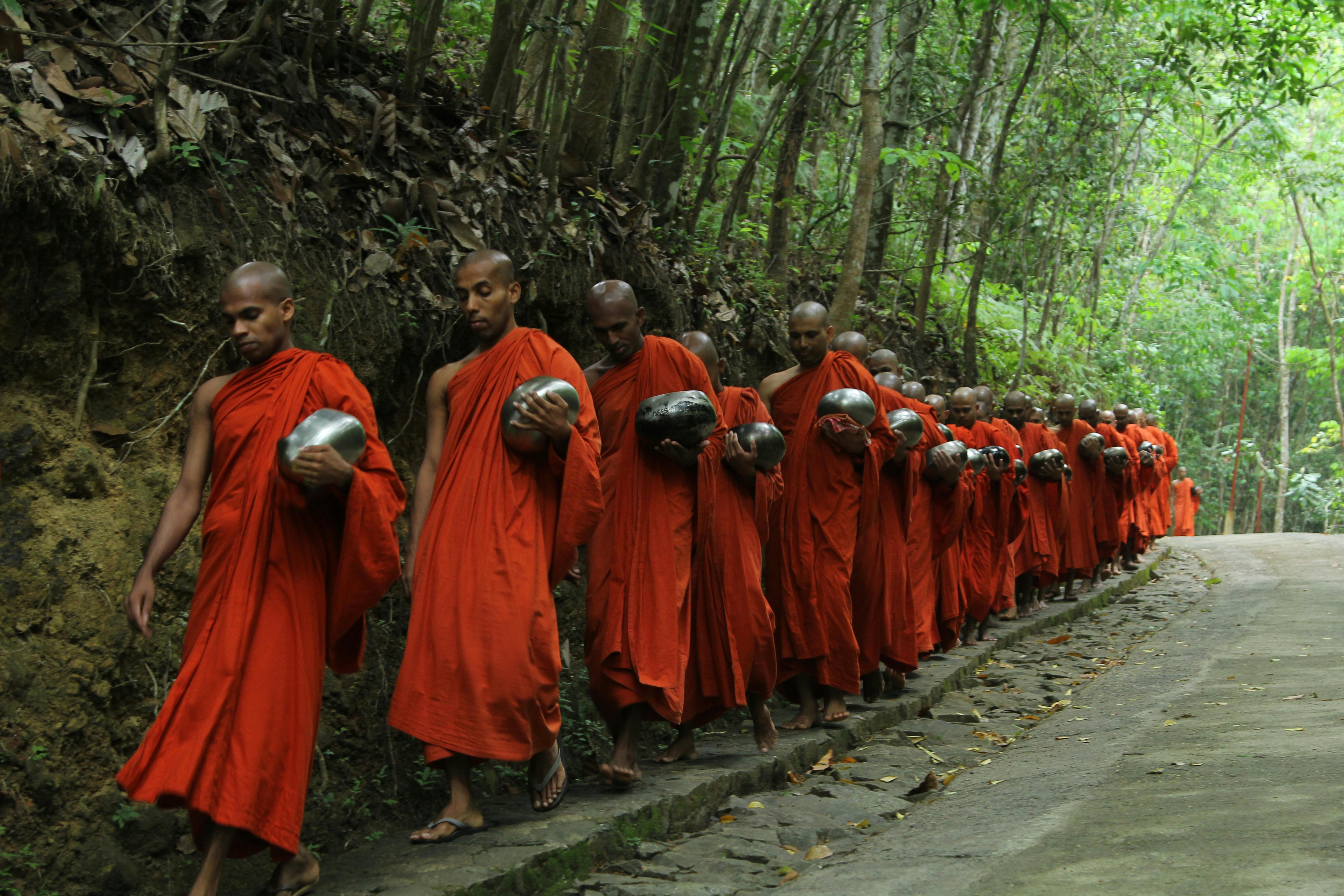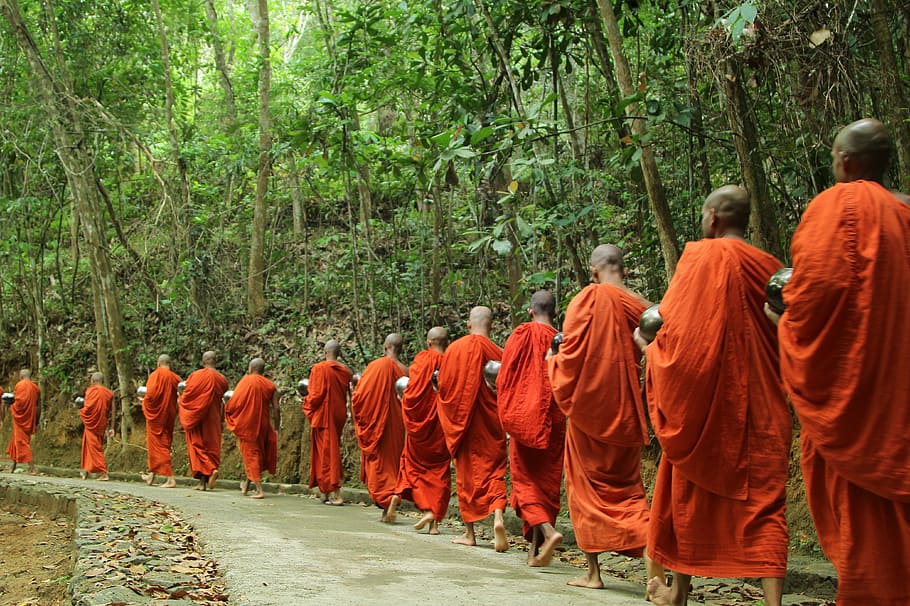Monks Deodorant Review: Embracing Natural Freshness From Ancient Traditions
Have you ever stopped to think about the kind of personal care products someone living a monastic life might choose? It's a curious thought, isn't it? The very idea of "monks deodorant review" might sound a bit unusual, but it really gets us wondering about simplicity, purity, and a connection to older ways of doing things. For those drawn to the quiet, reflective existence of monasteries, like the Eastern Catholic communities in the United States and Canada that some of us are learning about, there’s often a deep respect for natural rhythms and a desire to live without much fuss. This kind of life, you know, tends to focus on what's truly important, leaving out the unnecessary extras.
The monastic tradition, particularly in the Eastern Christian faith, holds a long and rich history. We often hear about monks and their commitment to prayer, community, and a life of deep devotion. But what about the everyday aspects of their existence? How do they approach personal well-being? This thought, actually, leads us to consider products that align with such a simple and unadorned way of living. It's not about luxury, but about practical, wholesome choices that support a peaceful life.
So, this article will explore what "monks deodorant" could mean in today's world. We'll look at the principles behind monastic living that might inspire such a product, consider natural alternatives that fit this spirit, and, in a way, give a "review" of the qualities one might seek in a deodorant truly inspired by a monk's simple path. We'll touch on how these ideas connect with a growing interest in natural, less complicated personal care items, too it's almost a perfect fit.
Table of Contents
- The Essence of Monastic Living and Personal Care
- What "Monks Deodorant" Might Mean Today
- Our "Monks Deodorant" Review: A Look at Natural Options
- Embracing a Mindful Approach to Personal Care
- Frequently Asked Questions About Monastic-Inspired Personal Care
The Essence of Monastic Living and Personal Care
When we think about monastic life, images of quiet contemplation, ancient prayers, and a detachment from worldly possessions often come to mind. This focus on the inner life, naturally, extends to how one cares for the body. It's not about neglecting oneself, but rather about approaching personal care with a sense of practicality and respect for creation. Monks, like the Melkite monks in Pennsylvania or the Carthusian order, typically follow rules that guide their entire day, including these very basic needs, so.
Simplicity and Natural Approaches
A cornerstone of monastic life, across different traditions, is simplicity. This means avoiding excess and embracing what is truly necessary. For personal care, this would suggest a preference for natural ingredients, items that are unadorned, and products that don't rely on artificial fragrances or complex chemical compounds. The idea is to keep things clean and straightforward, very much in line with a life dedicated to spiritual pursuits. It's about being present, you know, with what you have.
The emphasis on living close to nature, which is often part of monastic settings, would also influence choices. Think about the herbs grown in monastery gardens or the simple remedies passed down through generations. These natural elements, really, would form the basis of any personal care regimen. It's a way of honoring the earth and its gifts, too it's almost a core principle.
Historical Practices in Monastic Communities
Historically, monastic communities often relied on locally sourced materials for their needs. This included things for washing and general hygiene. They wouldn't have had access to modern chemical formulations, of course. Instead, they would have used things like natural soaps made from animal fats or plant oils, or perhaps even just water and simple cleansing herbs. This practical approach, basically, highlights a connection to the environment around them.
The prayer of St. Ephrem, which some forum members find beautiful, speaks to a desire for purity of heart. This spiritual purity, in a way, parallels a desire for physical cleanliness that is simple and unburdened by artificiality. The idea of "cleanliness is next to godliness" has roots in many spiritual traditions, and for monks, it's about maintaining a state of purity that supports their spiritual journey. This means, naturally, a very straightforward approach to hygiene.
What "Monks Deodorant" Might Mean Today
Given the historical context and the values of monastic life, what would a "monks deodorant" look like in our modern world? It's not about a specific brand sold by a monastery, but rather a product that embodies the principles of simplicity, naturalness, and effectiveness without being overly complicated. It's about finding freshness in a way that aligns with a more mindful existence, you know, rather than just masking things.
The Philosophy Behind It
The core philosophy behind a "monks deodorant" would be one of minimalism and respect for the body. It's not about smelling like a perfume shop, but about neutralizing odor in a gentle, non-intrusive way. This approach, actually, mirrors the monastic desire to reduce distractions and focus on what truly matters. It's about being present and comfortable in one's own skin, without artificial enhancements. This kind of product, very much, supports a quiet confidence.
It would also align with a concern for overall well-being. Many people today are looking for products free from harsh chemicals, aluminum, parabens, and synthetic fragrances. This search for "clean" personal care items, basically, resonates with the natural and unadorned approach that monks would likely favor. It's about supporting the body's natural processes, not fighting against them, so.
Modern Natural Alternatives Inspired by Tradition
Today, there are many natural deodorants that could be considered "monk-inspired." These products often use ingredients like baking soda, arrowroot powder, coconut oil, essential oils, and various plant extracts. They aim to absorb moisture and neutralize odor-causing bacteria without blocking sweat glands, which is a key difference from many conventional antiperspirants. This approach, honestly, feels much more in tune with nature.
Some even incorporate traditional elements like charcoal or clay, which have been used for cleansing and purification for centuries. The Jordanville prayerbook, which some Catholic faithful appreciate, represents a connection to tradition, and in a similar way, these natural ingredients connect us to older wisdom about personal care. It's a subtle nod to the past, offering a gentle yet effective solution for modern needs, you know.
Our "Monks Deodorant" Review: A Look at Natural Options
When we "review" a "monks deodorant," we're not talking about a single product, but rather the characteristics and experience of using natural deodorants that embody the monastic spirit. It's about finding something that feels right, that works simply, and that supports a sense of natural cleanliness. This is about what you can expect from products fitting this idea, very much.
Ingredients to Look For (and Avoid)
For a deodorant that aligns with monastic principles, you'd want to look for a very clear ingredient list. Good options often include things like:
- **Baking Soda:** A natural odor absorber.
- **Arrowroot Powder or Cornstarch:** Helps with moisture absorption.
- **Coconut Oil or Shea Butter:** Provide a smooth application and have some natural antimicrobial properties.
- **Essential Oils:** For light, natural scents, like lavender, tea tree, or frankincense, which has spiritual connotations.
- **Magnesium Hydroxide:** A gentle alternative to baking soda for sensitive skin.
The idea is to choose products that are as close to their natural state as possible, reflecting the unadorned nature of monastic life. This means reading labels carefully and understanding what you're putting on your body. It's a small step, perhaps, but one that aligns with a more conscious way of living, so.
Performance and the Experience of Use
The "review" of a "monks deodorant" really comes down to its performance and the experience it offers. Unlike conventional antiperspirants that stop sweating, these natural options focus on managing odor. This means you will still sweat, which is a natural bodily function, but the product helps to neutralize the bacteria that cause unpleasant smells. It's a different kind of freshness, you know.
The initial experience might be different from what you're used to. Some people find a transition period when switching to natural deodorants. However, many report feeling a cleaner, more natural kind of freshness once their body adjusts. The scents, if present, are usually subtle and come from essential oils, not overpowering perfumes. This understated quality, basically, fits the monastic ideal of not drawing undue attention to oneself. It's about feeling clean and comfortable, rather than masked. This page explores the benefits of switching to natural products.
Embracing a Mindful Approach to Personal Care
Thinking about "monks deodorant review" isn't just about finding a product; it's about considering a broader philosophy of living. It encourages us to look at our daily routines, including personal care, through a lens of simplicity, naturalness, and mindfulness. It's about making choices that align with a desire for less clutter, both in our physical surroundings and in our bodies. This approach, very much, can bring a sense of calm to our day.
Whether you're exploring a vocation to monastic life, as some are, or simply looking to simplify your daily routine, the principles behind a "monks deodorant" offer a valuable perspective. It reminds us that often, the most effective and wholesome solutions are the ones that are closest to nature and free from unnecessary complexities. It's a way of honoring both our bodies and the world around us, naturally, with every choice we make.
Frequently Asked Questions About Monastic-Inspired Personal Care
Here are some common questions people might have about this topic:
1. Do monks actually use a specific type of deodorant?
Well, it's not about a specific brand or product called "monks deodorant." The term here refers to the *idea* of personal care products that align with monastic values of simplicity, naturalness, and a lack of artificiality. Monks, generally, would use very basic, often natural, hygiene items available to them, so.
2. What are the main benefits of using a "monk-inspired" natural deodorant?
The benefits typically include avoiding harsh chemicals like aluminum and parabens, allowing your body to sweat naturally while still managing odor, and using ingredients that are often gentler on the skin. It's about a more holistic approach to freshness, you know.
3. Where can I find natural deodorants that fit this description?
Many health food stores, online retailers specializing in natural products, and even some mainstream stores now carry a wide range of natural deodorants. Look for brands that prioritize minimal, recognizable ingredients and clear labeling. You might find a good starting point by searching for "aluminum-free deodorant" or "natural deodorant with essential oils," for example. You can also explore more about the benefits of natural products at Healthline.

Monks Photos, Download The BEST Free Monks Stock Photos & HD Images

Monks Free Photo Download | FreeImages

Monk 1080P, 2K, 4K, 5K HD wallpapers free download | Wallpaper Flare